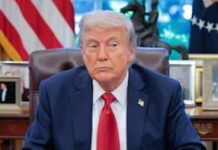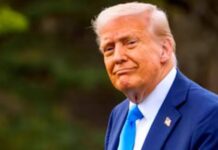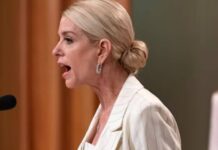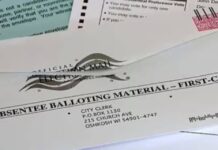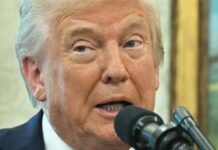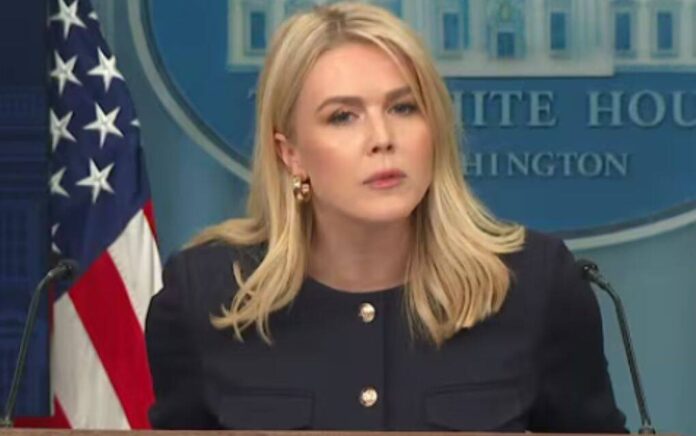
The mainstream media has never been favorable to Trump. But the Trump admin isn’t putting up with it.
Because the White House Press Secretary just torpedoed the Fake News Media with only four words.
Karoline Leavitt Shuts Down Media Claims of Caving to China
White House press secretary Karoline Leavitt set the record straight on Wednesday, dismantling the fake news media’s claims that President Donald Trump was softening his stance on China tariffs. Speaking with unwavering clarity, Leavitt declared that there will be “no unilateral reduction in tariffs” on China, emphasizing that any easing of trade restrictions hinges on China negotiating directly with the United States. Her statement directly countered reports that misrepresented Trump’s position as a retreat from his hardline trade policies.
The controversy erupted after Trump announced on Tuesday that the U.S. intends to ease tariffs on China “substantially,” though not eliminate them entirely. This followed his aggressive imposition of tariffs to address China’s unfair trade practices. The media pounced, framing Trump’s comments as a capitulation. However, Leavitt, appearing on Fox News’ “America Reports,” clarified the administration’s position with precision. She stressed that China must come to the table and strike a deal before any reciprocal tariff reductions are considered, exposing the media’s narrative as a distortion of the truth.
“There will be no unilateral reduction in tariffs against China,” Leavitt asserted. “The president has made it clear, China needs to make a deal with the United States of America and we are optimistic that will happen and when that continues, it will be up to the president [on] what the tariff on China will be. But we certainly need to see a reduction in tariffs and non-monetary tariffs from China as well, and we also need to continue seeing these companies abroad return their manufacturing to the United States so we can shore up these critical supply chains.” Her words underscored Trump’s commitment to protecting American interests while leaving room for diplomacy.
The tariff saga began on April 2, when Trump’s initial tariff announcement sparked a trade war with China. In retaliation, China imposed steep tariffs of its own, escalating tensions. By April 9, Trump upped the ante, raising tariffs on China from 104% to 125% after a 90-day pause on tariffs for other nations to allow for negotiations. The following day, he pushed the rate to a minimum of 145% on all Chinese tariffs, according to The New York Times. These moves signaled Trump’s resolve to counter China’s aggressive trade tactics head-on.
As of April 15, China faces tariffs as high as 245% due to its retaliatory measures, the White House confirmed. Trump also imposed 25% tariffs on Chinese steel, aluminum, cars, auto parts, and other goods, further tightening the screws. Far from backing down, these actions demonstrate the administration’s determination to level the playing field and protect American industries from China’s exploitative practices.
Trump himself addressed the tariff reductions on Tuesday, clarifying that while they will come down “substantially,” they will not drop to zero. He pointed to China’s past exploitation of lax U.S. trade policies, which allowed Beijing to reap massive profits at America’s expense. “It’ll come down substantially, but it won’t be zero. It used to be zero,” Trump said.
“We were just destroyed. China was taking us for a ride and just not going to — it’s not going to happen. We’re going to be very good to China. I have a great relationship with President Xi, but they would make billions and billions and billions of dollars a year, and they were building a military out of the United States on what they made.” His remarks reaffirmed his commitment to a strong, America-first trade policy.
Adding weight to the administration’s stance, U.S. Treasury Secretary Scott Bessent expressed optimism about de-escalating the tariff war during a Tuesday speech, as reported by The Associated Press. Bessent’s comments suggest that while the U.S. is open to negotiations, it will not compromise its leverage. This balanced approach—firm yet pragmatic—exposes the media’s portrayal of Trump as wavering for what it is: a deliberate misrepresentation.
Meanwhile, China has scrambled to forge trade deals with countries like Vietnam and several European nations in response to Trump’s tariffs. This pivot indicates that Beijing feels the pressure of the administration’s policies. By forcing China to seek alternatives, Trump’s strategy is reshaping global trade dynamics, compelling Beijing to reconsider its approach to the U.S.
Far from caving, Trump is playing a strategic game of chess, using tariffs as leverage to secure a fair deal with China. The media may spin their tales, but Leavitt’s clarity ensures the truth prevails: Trump’s America will not be taken for a ride.
The Federalist Wire will update you on any further global economic news from the Trump administration.


